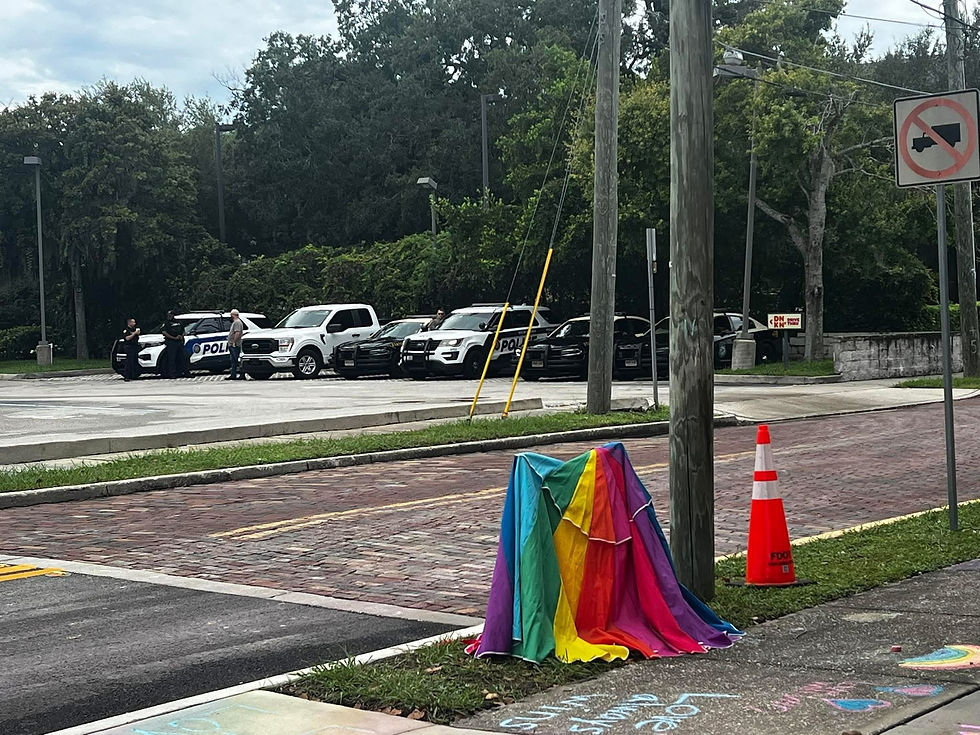The Disheartening Erasure of LGBTQ+ Symbols in Florida and Its Impact on Community Memorials
- 11 hours ago
- 4 min read

In recent weeks, a troubling trend has emerged in Florida: state authorities, including the Florida State Police and the Florida Department of Transportation (DOT), have begun patrolling and painting over pride crosswalks. This includes a crosswalk that serves as a memorial for the 49 victims of the Pulse Nightclub shooting. The act of erasing these symbols of love and acceptance has sparked outrage among LGBTQ+ communities and allies, highlighting a broader issue of discrimination against LGBTQ+ individuals in the state.
This situation escalated further when an individual was arrested for chalking in a replacement pride-colored crosswalk at the Pulse memorial. They were released following a judge's order, but this incident shows how far some are willing to go to protect symbols of pride. Erasing these symbols not only disrespects the memory of those lost but sends a message to LGBTQ+ individuals that their identities and histories are not valued or respected.
The Significance of Pride Symbols
Pride symbols, such as rainbow crosswalks, are vital reminders of the struggles and successes of the LGBTQ+ community. They reflect a commitment to inclusivity and equality. In places like Orlando, where the Pulse Nightclub tragedy occurred, these symbols are particularly meaningful as they honor the lives lost and the resilience of the community.
For example, in cities across the U.S., studies have shown that areas marked with LGBTQ+ symbols report higher community support and engagement, showing that these symbols create safe spaces. By painting over these crosswalks, state authorities erase not just colorful designs but also a significant part of the community's story. This act can have serious psychological impacts, reinforcing feelings of invisibility among LGBTQ+ individuals.
Community Response and Activism
The community's response has been swift and passionate. Activists and allies quickly organized protests and social media campaigns, aiming to raise awareness of the issue. According to a recent survey, 75% of LGBTQ+ individuals in Florida reported feeling marginalized due to recent policy changes. Many community members are calling for the reinstatement of pride crosswalks, stating that these symbols help foster belonging and security.
Local leaders have also stepped up, urging state officials to reconsider their actions. They argue that removing pride symbols is indicative of a broader pattern of discrimination against LGBTQ+ individuals. This sentiment resonates with those who believe that the current political climate has grown increasingly hostile toward marginalized communities.

The Broader Implications of Erasure
The erasure of pride symbols in Florida is part of a troubling trend of anti-LGBTQ+ sentiment in various regions of the United States. Recent legislative measures aimed at restricting the rights of transgender individuals and removing LGBTQ+ representation from educational materials contribute to a culture of fear. Reports from Erin in the Morning and the Human Rights Campaign highlight that numerous anti-LGBTQ+ bills, particularly anti-transgender bills have been introduced this year alone across the country.
For many, symbols of pride provide a sense of community and belonging, reminding them they are not alone in their struggles. Removing these symbols can lead to increased feelings of isolation, especially among young individuals who are still navigating their identities. A survey indicated that LGBTQ+ youth are more likely to face mental health issues, with 40% reporting symptoms of depression.
The Importance of Memorials
Memorials, such as the pride crosswalk at the Pulse Nightclub Memorial, and The National Historic Stonewall Memorial, where the federal government ordered the removal of trans pride flags and even the word 'transgender' from the site and the website in New York offer crucial spaces for remembrance and healing. They allow communities to unite in honoring those lost and reflecting on the ongoing fight for justice. By erasing these memorials, state authorities disregard the memories of victims and undermine collective grief within the community.
The Pulse Nightclub shooting was a devastating event that emphasized the urgent need for greater protections for LGBTQ+ rights. The pride crosswalk not only symbolizes the tragedy but also serves as a beacon of hope for a more inclusive future. Removing this crosswalk disrespects the memory of the victims and the ongoing struggle for equality, safety, health, and wellbeing.
Moving Forward: A Call to Action
As the community confronts the erasure of pride symbols, taking constructive action is essential. Advocacy and activism play a crucial role in ensuring that LGBTQ+ voices are amplified and their rights are protected. This includes advocating for pride crosswalks and other symbols of acceptance, as well as policies promoting equality.
Community members can also support local LGBTQ+ organizations that strive to provide resources and advocacy for marginalized individuals. By standing together, the community can deliver a strong message that love and acceptance will not be diminished.
In summary, the recent actions taken by the Florida Department of Transportation (FDOT) to remove pride crosswalks represent a troubling trend of erasure and marginalization of LGBTQ+ individuals. Communities must unite to advocate for these symbols and continue the fight for acceptance and equality. The legacy of those lost at Pulse deserves honor, serving as a catalyst for change and a reminder of the enduring importance of love and inclusivity.

Through unity, the LGBTQ+ community and its allies can ensure their voices resonate and that symbols of pride continue to shine brightly in Florida and beyond.
Watch Live Programming on this topic and many others. Click the image below that fits into your day.
Midday with Cassandra
in the middle of the day weekdays
times vary depending on caregiving needs for mom, brother, and sister
Eastern Time Zone.
The Path Forward
Weekdays at 6 PM Eastern Time




Comments